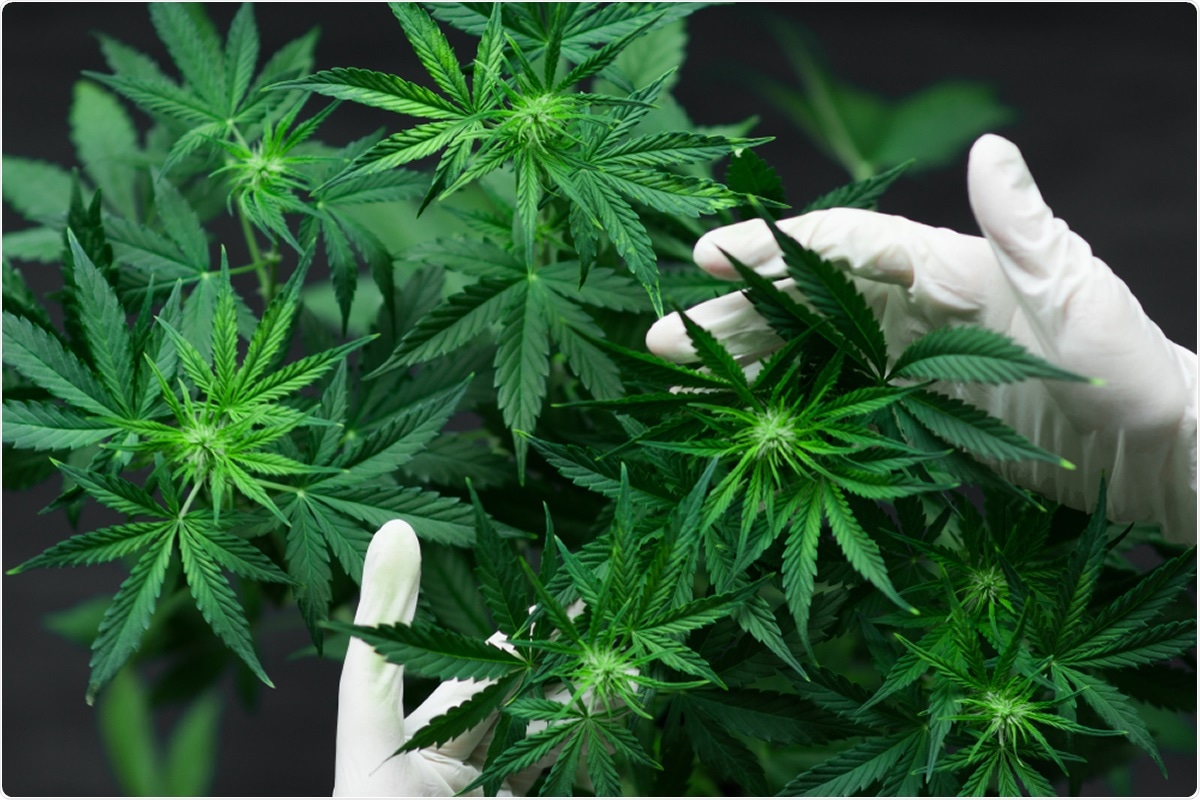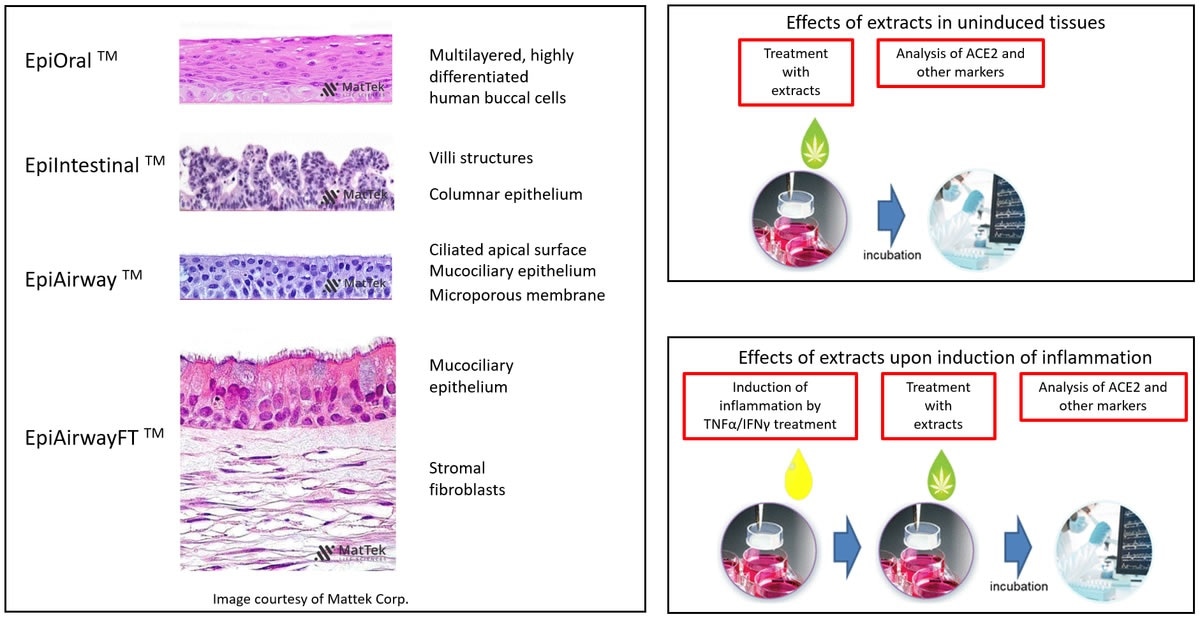Novel cannabis plant extracts could protect against COVID-19
November 30, 2020
Source: drugdu
 755
755
Researchers in Canada have conducted a study suggesting that novel Cannabis sativaextracts may decrease levels of the host cell receptor that severe acute respiratory syndrome coronavirus 2 (SARS-CoV-2) uses to gain viral entry to target tissues.

SARS-CoV-2 is the agent responsible for the current coronavirus disease 2019 (COVID-19) pandemic that continues to sweep the globe threatening public health and the worldwide economy.
The team – from the University of Lethbridge and Pathway Rx Inc., Lethbridge – developed hundreds of new C. sativa cultivars and tested 23 extracts in artificial 3D human models of the oral, airway and intestinal tissues.
As recently reported in the journal Aging, 13 of the extracts downregulated expression of the SARS-CoV-2 host cell receptor angiotensin-converting enzyme 2 (ACE2).
“The observed down-regulation of ACE2 gene expression by several tested extracts of new C. sativa cultivars is a novel and crucial finding,” say the researchers.
“While our most effective extracts require further large-scale validation, our study is important for future analyses of the effects of medical cannabis on COVID-19,” write Olga Kovalchuk and colleagues.

“Down-regulation of ACE2 levels in gateway tissues may be a plausible strategy”
The ACE2 receptor that SARS-CoV-2 and other coronaviruses use to access host cells is expressed in a range of tissues, including the lung, nasal mucosa, kidney and gastrointestinal tract.
One recent study reported high levels of ACE2 expression in oral epithelial tissues and suggested that the oral cavity could be an important target for prevention strategies.
Numerous studies have also reported high levels of ACE2 expression in the lower respiratory tract of patients with chronic obstructive pulmonary disease (COPD). This patient group is associated with increased susceptibility to COVID-19 and more severe disease.
“The down-regulation of ACE2 levels in gateway tissues may thus be a plausible strategy for decreasing disease susceptibility,” said Kovalchuk and colleagues.
Where does Cannabis sativacome in?
C. sativa, particularly cultivars rich in cannabidiol (CBD), have previously been shown to alter gene expression and to possess anti-inflammatory and anti-cancer properties.
However, the effects of C. sativa on ACE2 expression are not known, says the team.
Working under a Health Canada research license, the researchers developed more than 800 new C. sativa cultivars and extracts. They then used artificial 3D human models to test whether 23 of the extracts that were high in CBD would alter ACE2 expression in target COVID-19 tissues.
Given that inflammation is a significant component of viral disease, the researchers also examined the effect of the extracts on ACE2 expression in inflammation-stimulated 3D tissue models.
Using artificial 3D human models of oral, airway and intestinal tissues, the researchers identified 13 high-CBD C. sativa extracts that significantly downregulated the expression of ACE2.
The effects on tissues not stimulated by inflammation
In a model of airway tissues that had not been stimulated by inflammation, Western blot analysis identified six extracts that significantly downregulated the expression of ACE2 and two extracts that slightly upregulated its expression.
In a model of unstimulated oral tissue, two extracts downregulated ACE2 expression, while three other extracts upregulated its expression.
The effects on inflammation-stimulated tissues
Next, the team examined a model of oral tissue that had been stimulated by treatment with the inflammatory cytokines tumor necrosis factor-α (TNF-α) and interferon-γ (IFNγ).
Analysis by RNA sequencing showed that TNFα and IFNγ had upregulated mRNA levels of ACE2 in the oral tissue. However, all C. sativa extracts but one downregulated the expression of this altered ACE2 mRNA level.
Furthermore, in a model of inflammation-stimulated 3D intestinal tissues, two extracts significantly downregulated ACE2 mRNA levels, and in a model of stimulated airway tissues, all of the extracts attenuated the TNFα- and IFNγ-induced ACE2 expression.
“Using artificial 3D human models of oral, airway and intestinal tissues, we identified 13 high-CBD C. sativa extracts that decrease ACE2 protein levels,” writes the team.
What are the implications of the study?
The researchers say the findings provide a foundation for further analyses of the effects C. sativa may have on the pathogenesis of COVID-19 and other viral diseases where the ACE2 receptor is used as a molecular gateway.
“If these results are further confirmed, these high-CBD cannabis extracts can be used to develop prevention strategies directed at lowering ACE2 levels in high-risk gateway tissues,” they write.
“The extracts of our most successful novel high-CBD C. sativa lines, pending further investigation, may become a useful and safe addition to the prevention and treatment of COVID-19 as an adjunct therapy,” concludes the team.
Source: https://www.news-medical.net/news/20201126/Novel-cannabis-plant-extracts-could-protect-against-COVID-19.aspx
By editorRead more on
- The New CRISPR-Based Covid-19 Test Could Be a Game-Changer August 26, 2021
- Pfizer’s JAK inhibitor Xeljanz shows benefit in COVID-19 pneumonia August 25, 2021
- GSK, Vir look beyond COVID-19 to develop new therapies for flu and other respiratory viruses February 22, 2021
- Research finds decrease in radiotherapy treatments due to COVID-19 January 28, 2021
- Vicore Pharma’s C21 med shows promise in COVID-19 study December 23, 2020
your submission has already been received.
OK
Subscribe
Please enter a valid Email address!
Submit
The most relevant industry news & insight will be sent to you every two weeks.



